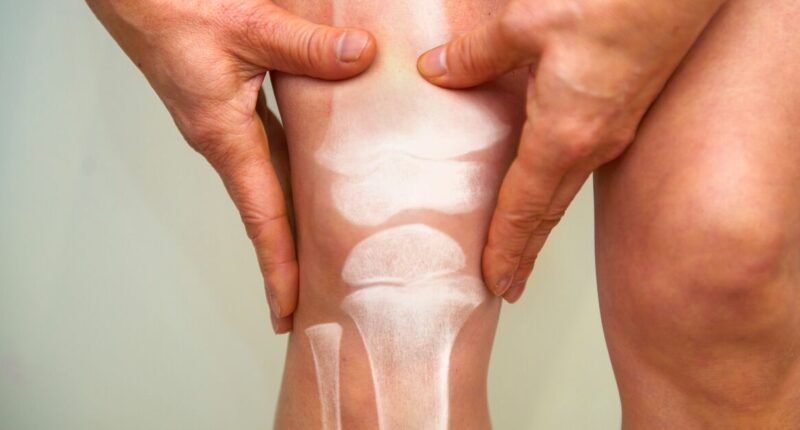Share this @internewscast.com
Bone health often remains an afterthought until an unexpected issue arises, typically manifesting as a fracture following a fall. In the UK alone, approximately 50,000 falls annually result in broken bones, frequently unveiling the presence of osteoporosis—a condition characterized by bone thinning.
Currently, about 3.5 million people in the UK live with osteoporosis, while an additional one million individuals have osteopenia, or low bone density. This condition elevates their risk of experiencing painful and potentially life-altering fractures.
The prevalence of osteoporosis is significant, affecting one in two women and one in four men over the age of 50 with fractures. However, this issue isn’t confined to older adults. Dr. Nicky Keay, a hormone specialist and Honorary Clinical Lecturer at University College London, as well as the author of “Myths of Menopause,” explains, “Our skeleton consists of bones that provide essential support, structure, stability, and protection for vital organs.”
“In addition to these roles, bones work in tandem with muscles to facilitate movement, store crucial minerals like calcium, phosphorus, and magnesium, and house marrow in certain long bones, where new red and white blood cells are produced,” she adds.
Several factors can compromise bone strength, but understanding them can help in managing their effects. Lorna Cooke, a dietitian at the Sports Institute of Northern Ireland, warns, “Repeated cycles of weight loss and gain over the years can diminish bone density. Restrictive diets impact hormones vital for bone maintenance, and insufficient intake of nutrients like calcium can lead to long-term deficiencies. When dietary calcium is inadequate, the body extracts it from bones, weakening them progressively.”
Years of yo-yo dieting:
“Repeatedly losing and regaining weight over many years can reduce your bone density,” says Lorna Cooke, dietitian at the Sports Institute of Northern Ireland. “When you restrict food, key hormones needed to maintain bone can be affected. A lack of nutrients such as calcium when following restrictive diets can also lead to long-term deficiencies – because when the body doesn’t get enough calcium from food, it takes it from bones, which weakens them over time.”
What to do: “Gradual weight loss is safer when it comes to protecting bone health,” adds Lorna. “By eating regular, well-balanced meals, healthy habits can be sustained, meaning the weight is more likely to stay off in the long run.”
Too little time outside:
“One of the major causes of osteoporosis is lack of vitamin D – the sunshine vitamin, made by the action of sunlight on skin,” says Dr Eamon Laird, vitamin D researcher at Trinity College Dublin. “Deficiency is common during winter as we can’t make enough in the Northern Hemisphere, so we rely on supplementation because diet alone can’t provide what we need.”
What to do: Rob Hobson, nutritionist at Healthspan, says: “For adults, taking a vitamin D supplement of 10 µg or more is recommended in winter – and all year round for those over 65, who don’t get outside much or have other risk factors.”
Menopause matters:
After menopause, bone loss accelerates due to falling oestrogen – particularly oestradiol – which normally helps slow bone breakdown. Women can lose up to 0.5% of bone density each year. By their mid-40s, many have lost a significant amount.
What to do: Tania Adib, Consultant Gynaecologist at The Medical Chambers Kensington, says: “Building strong bones early and protecting them through menopause is key. I believe women around 45 should be offered a DXA scan to check bone density. Prioritise weight-bearing exercise, good sleep and a healthy weight. HRT can be effective to prevent bone loss in the right women – especially those with early menopause or severe symptoms.”
Ultra-processed foods:
“Calcium and vitamin D-rich diets are essential for maintaining bone density,” says Healthspan nutritionist Rob. “The nutrient-deficient nature of a diet high in ultra-processed foods may negatively impact bone health. UPFs often lack the vitamins and minerals essential for strong bones.”
What to do: “To protect your bones, try to limit the amount of UPFs you eat each day and make more meals from scratch,” adds Rob. “A balanced diet that prioritises unprocessed whole foods – including wholegrains, protein, fruit, vegetables and healthy fats – provides the nutrients bones need to remain strong and healthy at all stages of life.”
Long-term meds or illness:
Some conditions, such as a hyperactive thyroid, can increase the body’s natural rate of bone loss. A booklet by Viridian Nutrition with GP Dr Siobhan Brennan, Medication + Nutrition For Optimal Support, explores the medications that can impact bone health, including some weight-loss drugs, steroids, cancer drugs, antidepressants and proton-pump inhibitors.
What to do: Ask your GP or pharmacist for a medicine review and check visit viridian-nutrition.com for more details.
Ditching dairy:
“Milk and dairy products such as cheese and yogurt are great sources of calcium,” says Lorna. “Excluding them from your diet due to veganism or health concerns can lead to deficiencies in calcium and vitamin D – and a greater risk of osteoporosis.”
What to do: Adults need around 1,000 mg of calcium daily. “If you’re cutting out dairy, replace it with calcium-rich alternatives such as fortified foods (bread, non-dairy milks), plant-based proteins (tofu, nuts and seeds), leafy greens, dried fruit and pulses,” says Lorna. “A supplement can help.” Try Healthspan Osteo Complete Bone Support, 240 tablets, £22.99, healthspan.co.uk
Gut diseases:
“The intestinal damage caused by Crohn’s disease or colitis, if left untreated, can lead to poor absorption of key nutrients like calcium and vitamin D – which long-term can lead to osteoporosis,” explains Lorna.
What to do: “Early diagnosis, and in some cases a strict diet advised by a dietitian, is key in allowing the intestinal lining to repair and start absorbing nutrients again,” says Lorna. “People may be prescribed calcium and vitamin D supplements.” A bone scan on diagnosis is also a good idea.
Too much or too little exercise:
Physical activity is vital for bone health, but the right type and amount is key. Those who aren’t active are at higher risk for bone loss, but those who over-exercise are too. “Most of us do too little, and our risk of brittle bones much earlier in life as young as our 30s and 40s – increases if we do next to no physical activity,” explains Dr Laird at Trinity College Dublin.
What to do: “Adults should aim for at least 30 minutes of activity per day, including weight-bearing exercises – where your feet and legs support your weight – such as walking or jogging, to strengthen and maintain bone health,” says Dr Laird.











